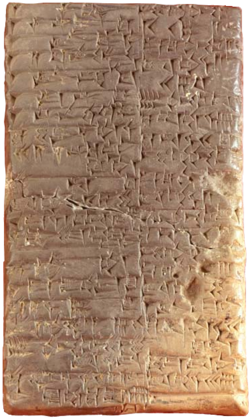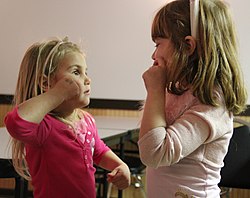Portal:Language
Introduction




Language is a structured system of communication that consists of grammar and vocabulary. It is the primary means by which humans convey meaning, both in spoken and signed forms, and may also be conveyed through writing. Human language is characterized by its cultural and historical diversity, with significant variations observed between cultures and across time. Human languages possess the properties of productivity and displacement, which enable the creation of an infinite number of sentences, and the ability to refer to objects, events, and ideas that are not immediately present in the discourse. The use of human language relies on social convention and is acquired through learning.
Estimates of the number of human languages in the world vary between 5,000 and 7,000. Precise estimates depend on an arbitrary distinction (dichotomy) established between languages and dialects. Natural languages are spoken, signed, or both; however, any language can be encoded into secondary media using auditory, visual, or tactile stimuli – for example, writing, whistling, signing, or braille. In other words, human language is modality-independent, but written or signed language is the way to inscribe or encode the natural human speech or gestures.
Depending on philosophical perspectives regarding the definition of language and meaning, when used as a general concept, "language" may refer to the cognitive ability to learn and use systems of complex communication, or to describe the set of rules that makes up these systems, or the set of utterances that can be produced from those rules. All languages rely on the process of semiosis to relate signs to particular meanings. Oral, manual and tactile languages contain a phonological system that governs how symbols are used to form sequences known as words or morphemes, and a syntactic system that governs how words and morphemes are combined to form phrases and utterances.
The scientific study of language is called linguistics. Critical examinations of languages, such as philosophy of language, the relationships between language and thought, how words represent experience, etc., have been debated at least since Gorgias and Plato in ancient Greek civilization. Thinkers such as Jean-Jacques Rousseau (1712–1778) have argued that language originated from emotions, while others like Immanuel Kant (1724–1804) have argued that languages originated from rational and logical thought. Twentieth century philosophers such as Ludwig Wittgenstein (1889–1951) argued that philosophy is really the study of language itself. Major figures in contemporary linguistics include Ferdinand de Saussure and Noam Chomsky. (Full article...)
Selected language -

Sanskrit (/ˈsænskrɪt/; stem form संस्कृत; nominal singular संस्कृतम्, saṃskṛtam,) is a classical language belonging to the Indo-Aryan branch of the Indo-European languages. It arose in northwest South Asia after its predecessor languages had diffused there from the northwest in the late Bronze Age. Sanskrit is the sacred language of Hinduism, the language of classical Hindu philosophy, and of historical texts of Buddhism and Jainism. It was a link language in ancient and medieval South Asia, and upon transmission of Hindu and Buddhist culture to Southeast Asia, East Asia and Central Asia in the early medieval era, it became a language of religion and high culture, and of the political elites in some of these regions. As a result, Sanskrit had a lasting effect on the languages of South Asia, Southeast Asia and East Asia, especially in their formal and learned vocabularies.
Sanskrit generally connotes several Old Indo-Aryan language varieties. The most archaic of these is the Vedic Sanskrit found in the Rigveda, a collection of 1,028 hymns composed between 1500 and 1200 BCE by Indo-Aryan tribes migrating east from the mountains of what is today northern Afghanistan across northern Pakistan and into northwestern India. Vedic Sanskrit interacted with the preexisting ancient languages of the subcontinent, absorbing names of newly encountered plants and animals; in addition, the ancient Dravidian languages influenced Sanskrit's phonology and syntax. Sanskrit can also more narrowly refer to Classical Sanskrit, a refined and standardized grammatical form that emerged in the mid-1st millennium BCE and was codified in the most comprehensive of ancient grammars, the Aṣṭādhyāyī ('Eight chapters') of Pāṇini. The greatest dramatist in Sanskrit, Kālidāsa, wrote in classical Sanskrit, and the foundations of modern arithmetic were first described in classical Sanskrit. The two major Sanskrit epics, the Mahābhārata and the Rāmāyaṇa, however, were composed in a range of oral storytelling registers called Epic Sanskrit which was used in northern India between 400 BCE and 300 CE, and roughly contemporary with classical Sanskrit. In the following centuries, Sanskrit became tradition-bound, stopped being learned as a first language, and ultimately stopped developing as a living language. (Full article...)
Did you know (auto-generated)

- ... that code-switching in Lebanon is so common that "hi, كيفك؟ Ça va ?", which combines English, Levantine Arabic and French, is a typical greeting?
- ... that the Māori-language name for Cave Rock, Sumner—Tuawera—means 'cut down as if by fire'?
- ... that when Felicia Schroeder signed to play soccer for the University of South Carolina, the school did not have a sign-language interpreter available for her?
- ... that the Labour Party of Turkey was banned by the Constitutional Court in 1980 due to its support for the use of the Kurdish language in schools?
- ... that Astrid Lindgren can be read in 100 languages?
- ... that Karan Aujla's Hindi-language single "Tauba Tauba" from the 2024 film Bad Newz became a Canadian Hot 100 top-25 song ahead of the film's release?
More did you know -
- ...that Bambaiya Hindi, a pidgin used in Mumbai, is a combination of English, Marathi, Gujarati and several other languages?
- ...that famous epic poems like Beowulf and Judith were written in Late West Saxon?
- ...that the Inuktun language, spoken by 1000 Inughuit people around Qaanaaq in northern Greenland, is related to Canadian Inuit languages?
- ...that most Russian-speakers in the United States are Jewish immigrants from the former Soviet Union?
Categories
Linguistics: Computational linguistics • Grammar • Historical linguistics • Morphology • Phonetics • Phonology • Pragmatics • Reading • Semantics • Sociolinguistics • Syntax • Writing
Languages: Language families • Pidgins and creoles • Sign languages
Linguists: By nationality • Historical linguists • Morphologists • Phoneticians • Phonologists • Sociolinguists • Syntacticians • Translators
Stubs: Constructed languages • Languages • Linguists • Pidgins and creoles • Typography • Vocabulary and usage • Writing systems
Full Language category tree
|
|---|
|
Select [►] to view subcategories
|
Related portals
Selected topic -
The languages of Singapore are English, Mandarin Chinese, Malay and Tamil, with the lingua franca between Singaporeans being English, the de facto main language in daily, governmental, legal, trade and commercial affairs. Among themselves, Singaporeans often speak Singlish, an English creole arising from centuries of contact between Singapore's multi-ethnic and multilingual society and its legacy of being a British colony. Linguists formally define it as Singapore Colloquial English. A multitude of other languages are also used in Singapore. They consist of several varieties of languages under the families of the Austronesian, Dravidian, Indo-European and Sino-Tibetan languages. The Constitution of Singapore states that the national language of Singapore is Malay. This plays a symbolic role, as Malays are constitutionally recognised as the indigenous peoples of Singapore, and it is the government's duty to protect their language and heritage. (Singapore is geographically located within the sociopolitical realms known as the Malay World or Nusantara.)
The three languages other than English were chosen to correspond with the major ethnic groups present in Singapore at the time: Mandarin Chinese had gained pre-eminent status (over the Southern Chinese dialects of the overseas Chinese) since the introduction of Chinese-medium schools; Malay was deemed the "most obvious choice" for the Malay community; and Tamil for the largest Indian ethnic group in Singapore, in addition to being "the language with the longest history of education in Malaysia and Singapore". In 2009, more than 20 languages were identified as being spoken in Singapore, reflecting a rich linguistic diversity in the city. Singapore's historical roots as a trading settlement gave rise to an influx of foreign traders, and their languages were slowly embedded in Singapore's modern day linguistic repertoire. (Full article...)
Selected picture -

Maryada Patral letter of conduct written by Acharya Bhiksu (first head of Jain Swetamber Terapanth sect) written in Rajasthani language
Language News
- 13 June 2025 – Middle Eastern crisis
- Exiled crown prince Reza Pahlavi, the son of Iran's last Shah, writes in Farsi calling for the Iranian military to abandon the Islamic Republic and accuses Supreme Leader Ayatollah Ali Khamenei of forcing Iranians into the war. He also refers to the war as "Khamenei's war and the Islamic Republic's war". (Jerusalem Post)
- 1 March 2025 – Executive orders in the second presidency of Donald Trump
- United States President Donald Trump signs an executive order designating English as the country's official language. (The Guardian)
- 27 February 2025 –
- OpenAI releases their latest large language model, GPT-4.5. (The Verge)
Topics

Languages of Africa: Arabic, Chadic, Cushitic, Kanuri, Maasai, Setswana, Swahili, Turkana, Xhosa, Yoruba, Zulu, more...
Languages of the Americas: Aleut, Carib, Cherokee, Inuktitut, Iroquois, Kootenai, Mayan, Nahuatl, Navajo, Quechuan, Salish, American Sign Language, more...
Languages of Asia: Arabic, Assamese, Balochi, Bengali, Chinese, Japanese, Hajong, Hebrew, Hindustani, Kannada, Kokborok, Marathi, Khasi, Korean, Kurdish, Malayalam, Manipuri, Meithei, Mongolian, Persian, Rajasthani, Sindhi, Sanskrit, Sylheti, Tamil, Tanchangya, Tulu, Telugu, Tibetan, Thai, Turkish, Vietnamese, Khowar, more...
Languages of Austronesia: Austric, Fijian, Hawaiian, Javanese, Malagasy, Malay, Maori, Marshallese, Samoan, Tahitian, Tagalog, Tongan, Auslan, more...
Languages of Europe: Basque, Czech, Danish, Dutch, English (book), French, German, Greek, Italian, Latin, Leonese, Norwegian, Polish, Portuguese, Romanian, Russian, Slovak, Spanish, Ukrainian more...
Constructed languages: Esperanto, Ido, Volapük, more...
Agglutinative language, Analytic language, Constructed language, Creole, Context-free language, Extinct language, Dialect, Fusional language, Inflectional language, International language, Isolating language, Language isolate, National language, Natural language, Pidgin, Pluricentric language, Polysynthetic language, Proto-language, Sign language, Spoken language, Synthetic language, Variety (linguistics)

Applied linguistics, Cognitive linguistics, Accent (dialect), Computational linguistics, Descriptive linguistics, Eurolinguistics, Generative linguistics, Historical linguistics, Lexicology, Lexical semantics, Morphology, Onomasiology, Phonetics, Phonology, Pragmatics, Prescription, Prototype semantics, Psycholinguistics, Semantics, Stylistics, Sociolinguistics, Syntax
See also: List of linguists

Alphabets: Arabic alphabet, Bengali alphabet, Cyrillic alphabet, Hebrew alphabet, Latin alphabet, more...
Other writing systems: Abjad, Abugida, Braille, Hieroglyphics, Logogram, Syllabary, SignWriting, more..
See also: History of the alphabet, Script
Associated Wikimedia
The following Wikimedia Foundation sister projects provide more on this subject:
-
Commons
Free media repository -
Wikibooks
Free textbooks and manuals -
Wikidata
Free knowledge base -
Wikinews
Free-content news -
Wikiquote
Collection of quotations -
Wikisource
Free-content library -
Wikiversity
Free learning tools -
Wiktionary
Dictionary and thesaurus
Find a language
| Enter an ISO 639 code to find the corresponding language article |













